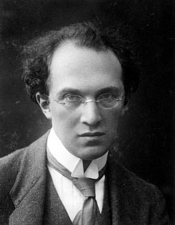Schreker’s operas, most of them set to
his own libretti, explore these psychological and musical trends with a more
embittered, less sentimental style of dramaturgy than that of many other
post-Wagnerians yet a more easily accessible idiom than the atonalists chose.
The characters of Der Ferne Klang (The Distant Sound) do not find
redemption, salvation or—at the last—even each other. They succumb
to delusions and distractions, they connect only to be alienated anew. Love is
a missed chance, art a deception.
Der Ferne Klang recalls the grander Italian operas of its day
(premiere, 1912) in setting its awkward love story on a stage teaming with
minor characters. But where other composers let the crowds fall away and bring
the love story, happy or sad, to the fore, in Der Ferne Klang the
distractions grow ever louder and more insistent and the love story cannot free
itself from them. Franz, the ambitious composer, abandons his truelove, Grete,
to seek the “distant sound” that inspires his art. By the time he
encounters her again—joyously—in Act II, she has become the main
attraction in a classy Venetian brothel. His memories win her back, but then he
rejects her on when he understands her present situation. In Act III,
Franz’s opera fails on its first night—in part because a strange
woman has screamed in the balcony. It is Grete, of course, now a streetwalker,
the one person deeply moved by Franz’s music. Franz repents his follies
in an ecstatic duet with her that climaxes in his collapse. Only then does the
real Grete enter to discover his body.
The blighting of all hope—love and art—God, of course, no longer
enters the question—is the message of many Schreker operas. The musical
texture is thick, polyphonic, late romantic with its own style of melodic
flourish, occasionally savoring of Strauss or Mahler at their most neurotic.
The orchestral forces required are large and their music complicated, the
messages difficult to interpret as every motif hides behind conflicted souls
and a pervasive unreality. Perhaps Schreker’s hopelessness, his scorn of
dreamy ideals, had more than a little real connection with the era he lived in.
When the Nazis came to power they resented his contempt for illusory ideals and
resurrected his paternal Jewish ancestry—Schreker, a lifelong Catholic,
had forgotten all about it—to expel his works from the stage, himself
from his academic position. Broken, he died in 1936—sparing himself,
perhaps , a more ghastly fate down the line.
Leon Botstein, champion of so many forgotten late romantic opera composers
(Zemlinsky, Janacek, Dukas, Smyth, d’Indy …), has done a real
service to American opera-lovers in giving us our first Der Ferne
Klang, in concert in New York three years ago, and our first staged one at
Bard College this summer. Much that was mysterious about the story in the
concert performance became clear in the thrilling staging at Bard—in a
theater it is far easier to grasp that what seemed disjointed and haphazard is
intentional, the composer’s technique for telling the story he wants to
tell and not the simpler fable we may anticipate.
In the cast at Bard, interesting singers were not always able to manage
Schreker’s soaring lines over the hefty orchestra, deployed not only in
the pit but in various strategic pockets of the stage. On the opening night
performance, Yamina Maamar, who sings Kundry, Salome and Aida in Germany, took
a while to warm to her tasks as Grete’s three avatars—her voice
often failed to cut clearly through the orchestra. Only in her concluding
ecstatic duet with Fritz did she seem a major voice with a voluptuous dramatic
soprano tone color. Her acting was affecting throughout the performance.
Matthias Schulz struck lyrical notes in the higher reaches of Fritz’s
music as if the top of his range was the distant sound he was after all along,
but was less successful in his middle voice. He ably played a
fish-out-of-water, an idealist in a society full of people with practical
concerns. Veteran character baritone Marc Embree sang a persuasively ruminative
Dr. Vigelius; Susan Marie Pierson an alluring/threatening Madam (partly behind
the scrim of a silent movie); and the rest of an enthusiastic cast were at once
alarming or funny doubling many roles. As with Les Huguenots last
summer, Botstein seems to have little trouble casting operas that require a
great many effective young singers.
Thaddeus Strassberger, whose staging of Les Huguenots last summer
was inventive if not entirely convincing, contributed tremendously to audience
excitement. His use of projections, filming shadows half-seen over
half-curtains, mirrors, subtle lighting effects and (by the by) Aaron
Blicks’s lighting and Mattie Ulrich’s splendid costumes held the
attention of listeners who might have been bewildered by the multilayered score
and the intricate story. An able young ensemble of chorus and dancers made the
most of the fantasies recalling Weimar (and pre-Weimar) decadence.
Der Ferne Klang (and its sister opera, Schreker’s Der
Gezeichneten) seems destined for a considerably wider showing in this
country where, based on the response of the Bard audience, it demonstrates
tremendous appeal to the same audiences who enjoy the operas of Strauss and
Alban Berg. Botstein has done a great service in bringing it twice to our
attention. Though there was a certain lack of coordination at the opening of
Act II, Botstein’s forces (including a small band of balalaika players to
accompany the cabaret in Act II) remained in good order all night and played
many of the subtler touches audible in the opera’s quiet moments with
particular grace.
John Yohalem
